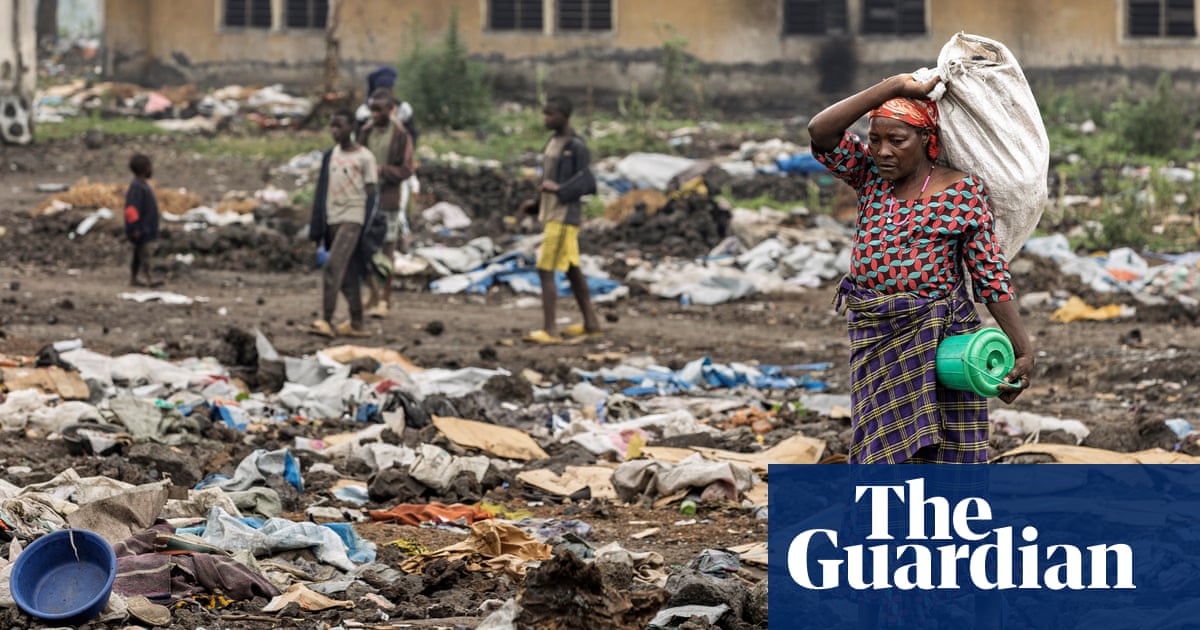

Israel’s far-right national security minister, Itamar Ben-Gvir, says he will quit if Israel approves Gaza ceasefire. Photograph: Ohad Zwigenberg/AP
Show key events only Please turn on JavaScript to use this feature
Live feed
Summary of the day so far
It’s nearly 1am in Tel Aviv and Gaza. Here’s a recap of the latest developments:
-
Israel’s prime minister, Benjamin Netanyahu, delayed a cabinet meeting originally scheduled for Thursday to vote on and ratify a Gaza ceasefire and hostage release deal. In a statement released before a planned security cabinet and wider government meeting, Netanyahu’s office accused Hamas of having “reneged on parts of the agreement” which had created a “last-minute crisis”, and said cabinet would not convene until “Hamas accepts all elements of the agreement”. A senior Hamas official, Izzat el-Reshiq, said after Netanyahu’s announcement that the group remained committed to the ceasefire deal.
-
Senior US officials insisted the hard-won ceasefire would go into effect on Sunday as planned despite the unexpected delay. The US secretary of state, Antony Blinken, said he was “very confident” that the ceasefire would go forward and he “fully expects that implementation will begin, as we said, on Sunday”. He confirmed that there had been a “loose end” between the sides in the complex negotiations. US representatives are still believed to be actively involved with talks in Doha on the final details needed to get the deal over the line.
-
A vote is now expected to take place on Friday morning, Israeli media reported. Prime minister Benjamin Netanyahu’s hardline national security minister, Itamar Ben-Gvir, announced on Thursday evening that he would quit the government if it ratifies the ceasefire deal, calling it “irresponsible” and “reckless”. Ben-Gvir’s departure would not bring down Netanyahu’s government. Opposition leader Yair Lapid pledged his support for Netanyahu, saying that the deal was “more important than any disagreement we’ve ever had.”
-
Fighting has continued in Gaza despite expectations of a ceasefire, with at least 80 Palestinians killed and hundreds more injured by Israeli airstrikes since the ceasefire announcement, according to the civil defence agency. The Israeli military said that it had conducted strikes on “approximately 50 terror targets” across Gaza since late Wednesday. A civil defence spokesperson said its teams had recovered the bodies of five children after a strike on the northern city of Jabalia.
-
More than 46,788 Palestinians have been killed and a further 110,453 wounded by Israel’s military offensive in Gaza, according to the latest figures by the territory’s health ministry on Thursday. They include 81 killed and 188 injured in the past 24 hours. Among them was Fatin Shaqoura-Salha, the chief of nursing staff at Al-Awda hospital in Nuseirat, ActionAid said.
-
The ceasefire agreement, announced on Wednesday but which has not been formally agreed, is supposed to come into effect on Sunday. In the first phase, to last 42 days, Hamas agreed to release 33 hostages and in exchange, Israel would release 50 Palestinian prisoners for every female Israeli soldier released by Hamas, and 30 for other hostages. Palestinians displaced from their homes would be allowed to move freely around Gaza, wounded people would be vacuated for treatment abroad, and aid to the territory should increase to 600 trucks a day. A second phase would include Israel completely withdrawing from Gaza.
-
The leader of Yemen’s Houthis, Abdul-Malik Badr al-Din al-Houthi, said the Iran-aligned group would suspend their attacks on Red Sea targets but continue if Israel backtracks on the ceasefire. The Houthi attacks have damaged as many as 30 ships and caused a diversion of commercial shipping to South Africa and the Cape of Good Hope. Reprisals by the US, Israel and the UK have damaged key Yemen ports and led to multiple deaths.
-
Arab states are urging Israel and the incoming Trump administration to allow the Palestinian Authority (PA), in conjunction with the UN Palestinian relief agency Unrwa, to oversee Gaza’s recovery. The future governance of Gaza is due to be discussed at the start of negotiations on the second stage of the deal 16 days after a ceasefire begins.
Key events Show key events only Please turn on JavaScript to use this feature
In case you missed this story earlier, families of hostages being held in Gaza have said the delays to the ceasefire and hostage deal have left them in limbo and agony.
Stephen Brisley, whose brother-in-law Eli Sharabi, 52, was taken hostage from the Be’eri kibbutz, said the delays had caused “further torture” for his family. Brisley’s sister Lianne Sharabi, a British citizen, and her daughters Noiya and Yahel were killed in Hamas’s 7 October 2023 attack.
Brisley said:
I don’t really know how to feel because it’s still quite difficult to process and doesn’t feel quite real.
I’m saying I’m cautiously optimistic, but a bit wary at the same time because we’ve had so many false dawns in the past.
The full story from Emine Sinmaz and Bethan McKernan can be read here:
An envoy from president-elect Donald Trump took part in the final negotiations on the ceasefire deal side-by-side with an incumbent official in Biden’s White House in a highly unusual arrangement, as Agence France-Presse reports.
In Washington, US secretary of state Antony Blinken was asked about Trump claiming he sealed the deal and Blinken responded: “The important thing is not who gets the credit; the important thing is getting the results.”
Virtually everything that now needs to be implemented under the agreement will be implemented under the Trump administration.
It was very important for the parties to know that the Trump administration stood behind the agreement that we negotiated.
Asked whether the Biden administration would leave without any determination on whether Israel had carried out human rights violations, Blinken said:
In Gaza, we faced a uniquely challenging situation in trying to make final determinations.
Uniquely in Gaza, besides having a population that’s been trapped there that has nowhere else to go, you have an enemy that embeds itself in and among civilians, houses, hospitals, mosques, schools.
Blinken, speaking at a farewell news conference, also defended his own record on human rights, pointing to statements and sanctions against extremist Israeli settlers over violence against Palestinians in the West Bank.
-
This is Adam Fulton picking up our live coverage
Summary of the day so far
It’s nearly 1am in Tel Aviv and Gaza. Here’s a recap of the latest developments:
-
Israel’s prime minister, Benjamin Netanyahu, delayed a cabinet meeting originally scheduled for Thursday to vote on and ratify a Gaza ceasefire and hostage release deal. In a statement released before a planned security cabinet and wider government meeting, Netanyahu’s office accused Hamas of having “reneged on parts of the agreement” which had created a “last-minute crisis”, and said cabinet would not convene until “Hamas accepts all elements of the agreement”. A senior Hamas official, Izzat el-Reshiq, said after Netanyahu’s announcement that the group remained committed to the ceasefire deal.
-
Senior US officials insisted the hard-won ceasefire would go into effect on Sunday as planned despite the unexpected delay. The US secretary of state, Antony Blinken, said he was “very confident” that the ceasefire would go forward and he “fully expects that implementation will begin, as we said, on Sunday”. He confirmed that there had been a “loose end” between the sides in the complex negotiations. US representatives are still believed to be actively involved with talks in Doha on the final details needed to get the deal over the line.
-
A vote is now expected to take place on Friday morning, Israeli media reported. Prime minister Benjamin Netanyahu’s hardline national security minister, Itamar Ben-Gvir, announced on Thursday evening that he would quit the government if it ratifies the ceasefire deal, calling it “irresponsible” and “reckless”. Ben-Gvir’s departure would not bring down Netanyahu’s government. Opposition leader Yair Lapid pledged his support for Netanyahu, saying that the deal was “more important than any disagreement we’ve ever had.”
-
Fighting has continued in Gaza despite expectations of a ceasefire, with at least 80 Palestinians killed and hundreds more injured by Israeli airstrikes since the ceasefire announcement, according to the civil defence agency. The Israeli military said that it had conducted strikes on “approximately 50 terror targets” across Gaza since late Wednesday. A civil defence spokesperson said its teams had recovered the bodies of five children after a strike on the northern city of Jabalia.
-
More than 46,788 Palestinians have been killed and a further 110,453 wounded by Israel’s military offensive in Gaza, according to the latest figures by the territory’s health ministry on Thursday. They include 81 killed and 188 injured in the past 24 hours. Among them was Fatin Shaqoura-Salha, the chief of nursing staff at Al-Awda hospital in Nuseirat, ActionAid said.
-
The ceasefire agreement, announced on Wednesday but which has not been formally agreed, is supposed to come into effect on Sunday. In the first phase, to last 42 days, Hamas agreed to release 33 hostages and in exchange, Israel would release 50 Palestinian prisoners for every female Israeli soldier released by Hamas, and 30 for other hostages. Palestinians displaced from their homes would be allowed to move freely around Gaza, wounded people would be vacuated for treatment abroad, and aid to the territory should increase to 600 trucks a day. A second phase would include Israel completely withdrawing from Gaza.
-
The leader of Yemen’s Houthis, Abdul-Malik Badr al-Din al-Houthi, said the Iran-aligned group would suspend their attacks on Red Sea targets but continue if Israel backtracks on the ceasefire. The Houthi attacks have damaged as many as 30 ships and caused a diversion of commercial shipping to South Africa and the Cape of Good Hope. Reprisals by the US, Israel and the UK have damaged key Yemen ports and led to multiple deaths.
-
Arab states are urging Israel and the incoming Trump administration to allow the Palestinian Authority (PA), in conjunction with the UN Palestinian relief agency Unrwa, to oversee Gaza’s recovery. The future governance of Gaza is due to be discussed at the start of negotiations on the second stage of the deal 16 days after a ceasefire begins.
Israel’s far-right national security minister, Itamar Ben-Gvir, threatened on Thursday to resign from prime minister Benjamin Netanyahu’s government if it ratifies the ceasefire deal.
“The deal that is taking shape is a reckless deal,” he said in a televised statement, saying it would “erase the achievements of the war” by releasing hundreds of Palestinian militants and withdrawing from strategic areas in Gaza, leaving Hamas undefeated.
White House confident that ceasefire deal on a 'glidepath towards implementation'
Faisal Ali
The White House’s national security spokesperson, John Kirby, struck an optimistic tone regarding the prospects for implementing the Gaza ceasefire and hostage release deal during an interview with CNN.
“We believe we’re on a good path here to begin implementation by the weekend,” said Kirby, adding: “We’ve seen nothing that would tell us this will get derailed at this point.”
Kirby acknowledged the impact the deal is having on prime minister Benjamin Netanyahu’s fragile coalition but remarked that “Israeli politics has to churn through this.”
He expressed confidence, however, that the deal was on a “glidepath towards implementation.”
CNN’s Jake Tapper also asked about Joe Biden’s legacy in light of the significant civilian costs in Gaza during the course of the fighting and the impact it had on Biden’s administration.
Kirby defended the outgoing president’s record, saying that the US “came to the defence of our ally and friend Israel, in fact to the point of putting US pilots and US jets in the air to defend Israel from missiles and drones fired by Iran, and kept the IDF in the fight.”
'We are living on our nerves': Families await release of Palestinian prisoners
Families of Palestinian prisoners held in Israeli jails are eagerly awaiting their release following a ceasefire agreement between Hamas and Israel that will liberate hundreds of detainees.
One thousand Palestinians arrested by Israeli troops in Gaza after the Hamas attack of 7 October 2023 who did not take part in the offensive will be released, and some of the freed Palestinians from the West Bank will be sent to third countries rather than be allowed to return home.
Mervat Moadi, 53, from the village of Jifna, north of Ramallah, was waiting anxiously for the official list of Palestinian prisoners to be released. Her husband, Marwan, 64, was jailed in 2012 for allegedly participating in an infamous incident in the second intifada in which two army reservists who got lost were lynched by a crowd at a police station in Ramallah in 2000. He denies any wrongdoing, saying he was present in a crowd of funeral mourners.

The couple have three sons, and grandchildren the man has never met. “The last time I visited him was in July 2023, and after that we were unable to see him during the war,” Mervat said. ‘
I am very nervous. My heart tells me that I will see him. Every hour that passes feels like a year. Waiting is very difficult for the family. We, as wives of prisoners, whether Palestinian or Israeli, suffer every moment. We do not know when we will see our loved ones.
‘‘The moment of waiting and anticipation is a deadly one,” she said.
Israel’s minister of diaspora affairs and combating antisemitism, Amichai Chikli, has threatened to resign if Israel withdraws from the Philadelphi corridor, as outlined in phase one of the ceasefire deal.
In a statement posted to X, he wrote:
I hereby undertake that if, God forbid, there is a withdrawal from the Philadelphi corridor (before the war goals are achieved), or if we do not return to fighting in order to complete the war goals – I will resign from my position as a government minister.
Chikli’s announcement is significant as he is the first member of the Likud party, led by prime minister Benjamin Netanyahu, to threaten to quit over details of the agreement.
Here are some of the latest images from Israel, where protesters have gathered in Tel Aviv and Jerusalem on Thursday night ahead of an expected ceasefire deal between Israel and Hamas.





Palestinian leaders who administer the occupied West Bank are preparing themselves in case they are tasked with running critical services and setting up an interim government in Gaza.
The Palestinian prime minister, Mohammad Mustafa, met with top officials to discuss plans for reintegrating government institutions in Gaza, Associated Press reported.
This would include the Palestinian territory’s healthcare, education, water and power sectors, as well as coordinating a surge of humanitarian aid.
There is still no plan for who will govern Gaza after the war. Israel has said it will work with local Palestinians not affiliated with Hamas or the western-backed Palestinian Authority.
The World Health Organization (WHO) has assessed that at least $10bn will be needed to rebuild Gaza’s devastated health system over the next five to seven years.
“In Gaza, we all know the destruction is so massive. I have never seen that anywhere else in my life,” WHO representative in the Palestinian territories, Rik Peeperkorn, told reporters.
Meanwhile, the UN health agency urged the international community to step up and fund a scaled-up aid response in Gaza after Wednesday’s announcement that Israel and Hamas had reached a ceasefire agreement.
Part of the ceasefire deal – which has not been formally agreed – requires 600 truckloads of humanitarian aid to be allowed into Gaza every day.
“The UN cannot deliver the response alone,” Peeperkorn said. He said the WHO was ready to deliver, although the “significant security and political obstacles to delivering aid across Gaza” need to be removed.
Explore more on these topics

Families await release of Palestinian prisoners after ceasefire deal

Families of hostages held in Gaza say they are in agony over ceasefire delays

‘We will be betrayed’: cold, fearful and still under fire, Gaza’s people wait

Arab states urge Israel and US to let Palestinian Authority oversee Gaza recovery

Islamist groups in Middle East will emerge from Gaza war weakened

Gaza deal should benefit Netanyahu in short term, but he is critically exposed

‘A ray of light’: Palestinian and Jewish leaders in UK respond to ceasefire deal

Biden or Trump – who should claim credit for the Gaza ceasefire deal?










 English (US)
English (US)